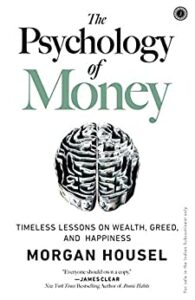 The Psychology of Money by Morgan Housel
The Psychology of Money by Morgan Housel
This a book much talked about and much reviewed and I don’t intend an attempt to evaluate the contents. The idea behind this post is just to record the impressions it cast on my mind.
There are many popular books on investments or how to get rich or how to succeed in a business. This is definitely not in that genre. There is no magic wand to get rich and more importantly there is no need for one
In my mind, money , or lack of money , is something that affects every facet of your life. Ideally, one should not be , forever engaged in making money or in guarding your wealth, and yet when the need arises there should be enough to meet that need comfortably.
If this be the aim, it does not necessarily mean making tonnes and tonnes of money. Mahatma Gandhi , once he switched to the Ashram mode of living, around 1904, never owned any wealth. Yet what a great fund raiser he proved to be!
Well, that’s for Mahatma; a common man has to understand enough about earnings, savings, investments, insurance and taxes to attain ‘Financial Nirwana’.
Yes , that’s what I call it; ‘Financial Nirwana‘ to organise your financial affairs in such a way that you get what you want ,when you want and yet do not have to take so much risk causing you to lose sleep over it or allow it to rob you of the precious time that you would rather spend with your family or in activities close to your heart.
The book covers the behavioral aspects related to earning, spending and investing. While these are activities related to external environment, there is more to consider on internal factors. What drives your behaviour is the ideas you value; the idea of freedom, contentment and happiness.
Aparigraha (non possession) is considered a great virtue in ancient Indian philosophy. Does it mean renouncing all wealth? Mahatma Gandhi interpreted the idea to mean holding the wealth as a trustee rather than an owner.
In this book , the author tries to differentiate between need and greed. He suggests that, big cars, big house or rich life style are acquired at a great cost only to impress others, quite unsuccessfully at that, and a decent house, decent car and a decent lifestyle are what one really needs. Of course ,the word ‘decent ‘ could have an elastic interpretation to mean anything in the range from a 2BHK (Two bedroom house) to a penthouse.
The book is organized into 20 chapters; eighteen of them on simple ideas leading to financial Nirwana, 19th is a summary and the 20th covering his own course in life.
There is nothing really new or earth-shattering revelations. Most of the issues are known to most people but seldom followed in real life. The book starts with the idea that, on hindsight, it may appear that many people have made crazy financial decisions. In reality, when seen from the point of view of these individuals, every decision had been backed by reasoning prompted by the situation they were in. The author says Finance should be taught from psychology point of view rather than as a technical subject.
There is a lot of anecdotes covering the aspects of savings, effect of compounding, need for a caution and so on.
The book also talks of the need for contentment. This sounds so unamerican ; the idea that one should limit his wants (not needs) . But that is where the idea of balance comes in . If you go on blindly chasing wealth , you miss out everything that wealth can give you including the most important thing, Freedom.
“THE HIGHEST FORM of wealth is the ability to wake up every morning and say, “I can do whatever I want today.”
The book touches on the relation between money and the degree of happiness it can bring .
Virtues of moderation is highlighted.
Aiming, at every point in your working life, to have moderate annual savings, moderate free time, no more than a moderate commute, and at least moderate time with your family, increases the odds of being able to stick with a plan and avoid regret than if any one of those things fall to the extreme sides of the spectrum.
I am so tempted to quote from the book extensively , and if I give in to that temptation, I am afraid ,I’ll end up copy pasting half the book.
Here are my notes on the book ,for someone interested in details.
A point to note is that modern trends in world of personal finance (to include Equities, insurance, retirement plans ) is still something new for most of us.
As social system is changing , all we have to support us whether during active working life or in post retirement life is just our ‘financial prudence‘.
A must read book for all.
